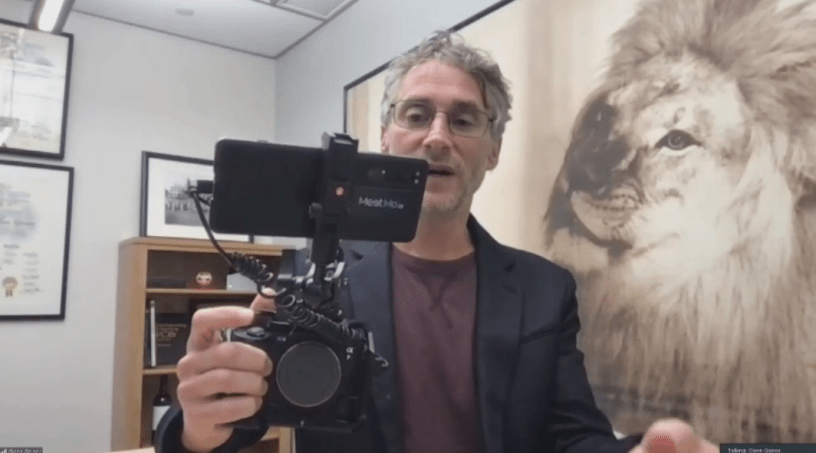COVID hasn’t just physically changed the way sets operate, it’s also changed workplace culture – with a little help from technology.
That’s according to Glenn Gainor, Amazon head of physical production, Amazon Original movies, Amazon Studios, who beamed in from LA via Zoom to address CinefestOz’s industry strand last week.
Gainor recalled that pre-COVID, showing up on set, in sickness or in health, was a “badge of honour”. The pandemic has since shifted mindsets about how films are to be produced, with technology facilitating the process.
“If you weren’t feeling well, you still showed up. You’ve got to direct a movie. You’ve you got to act in the film,” he told the audience.
“I think that culture’s now permanently changed. If a director’s not feeling well, you still want them to have the ability to direct. You’ve got cast on set. You might have very special locations; you’ve got to get in, you’ve got to get out. You have finite amount of time, money – so many reasons may compel you to continue on.
“I am impressed with a lot of the low latency directing connections that we have. If a director is not well, you can say ‘Go home’. You can be in your place of comfort and have your monitors set up, you’re able to direct; you’re able to see all the shots, you are able to communicate.
“We’re seeing capabilities where you’ll have instant 5G sent from your camera to a monitor, live-streamed and all you need is a certain phone and app.”
Gainor believes this technology, which allows footage to be transferred instantly in high-resolution, may have further benefit. Live-streams could be sent through to an editor for example, or it may benefit shooting in difficult locations. It may even impact storytelling. He sees this as the shift in filmmaking from the 20th century towards the 21st.
“If you’re doing a traditional studio film, you may want to do a road trip and have people drive for miles and miles, and free drive… whatever makes sense for the story. Again, great technology [means] people back in Video Village can be making sure everything is working well.
“It used to be we were a very huddled in group; everybody on the shot maker – all 15 of us in that truck. We can spread out now with this kind of technology, be a little more civilised in that sense. These are advances.”
Other key technology changes into the future include virtual production, something that Gainor argued will continue to change how movies are made and throw up new challenges.
“You’ll also be seeing those [LED] screens, by the way, in movie theatres; the concept of 35 mm projection thrown onto the wall is also something that [we’re] going to be challenged with; screens are going to push imagery at us.
“The average audience member may not tell the difference, but we as filmmakers need to know we’re going towards that. So what does that mean as a storyteller? It means we’ve got to be more aware of high dynamic range, where we’re going to have more intensity and illumination. If you point the camera towards the sun, it could really be blinding to somebody in the theatre, and eventually in the home, as we segue to 8K. You’ll squint from the image being pushed at you by the technology.
“So how do we tell stories knowing that we’re going towards that world? How do we future protect so that our films don’t look quaint, but actually stay progressive? We want our movies to live for years upon years upon years.”
When it comes to shooting under COVID-19 more generally, the exec regards the COVID-Safe protocols that Australia established early on in the pandemic in order to re-establish production as an inspiration internationally. Notably, in April 2020 Fremantle Australia’s Neighbours was one of the the first TV dramas to restart production worldwide, while the Sydney-shot Children of the Corn, which never shutdown, was among the first projects to establish now common practice bubble systems.
“The first place we looked for at guidance was Australia because of this so-called ‘pod system’,” Gainor, who was working for Sony’s Screen Gems at the time, said.
“Part of that became something we adapted as well.”
Gainor predicted that COVID-Safe practices will be part of production for a long time into the future, continuing to exist in the same way as general health and safety protocols.
In June, Netflix became the first major studio to implement a blanket policy mandating vaccinations for the casts of all of its US production. It is expected other studios will follow suit, including Amazon. As Australia’s vaccination rate picks up pace, it seems just a matter of time until similar conversations begin here.
For Gainor, vaccinations now are an essential part of the conversation..
“We’ve still got to take this very seriously. The biggest defense we have for this, according to our specialists, is asking people to be vaccinated.
“We’re one of the very few industries that says certain people can wear a mask to work, but yet others – the actors – can’t. So everything we do is to protect not just our crew, our director and our producers, but to protect our actors. They’re the ones who have to take the mask off and act, and pretend that there isn’t a pandemic going on.”
The executive joined Amazon in November last year because of its content and creative leadership, as well as the diversity of global stories, and hinted there will soon been Amazon Studios films coming to Australia.
“I’m here in so-called Hollywood; Culver City, LA. We have a certain vision, but filmmakers in Western Australia can have a different version, a different vision. It’s important to empower people to tell their stories based on where they are in the world. That’s really critical. We don’t want to filter that. We want to celebrate the differences.”


